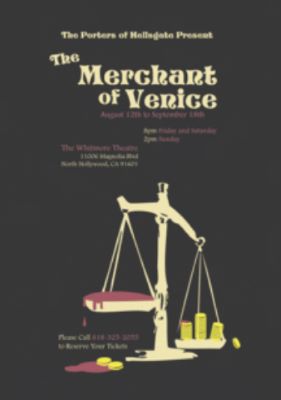
AN OUNCE OF MISSTEPS IS WORTH
THIS POUND OF FLESH
Before you run off to see The Porters of Hellsgate production of William Shakespeare’s The Merchant of Venice — and I surely hope that you do — let us clear something up once and for all regarding the nature of its topicality. It would be a shame for anyone to miss this marvelous young theatre company because of [whispered softly] The Jew. With all of the wonderful characters in Merchant, we think of Shylock as the dominant one, mainly because of the famous pound of flesh as retribution for an unpaid loan. Indeed, the play in Shakespeare’s day and long thereafter was referred to as The Jew of Venice (the merchant in the play is the one who took out the loan, although he is assuredly not the central figure).
This play is a comedy. By treating it as such, adding a stylized approach that mimics the cable series Mad Men, and showcasing some stellar talent, The Porters have whipped up some of the funniest moments seen in the theatre. Guffaws, gorgeous language, and lovely performances: you would give all of that up because of the controversy surrounding Shylock?
No one can deny that Europe has had a deplorable history regarding the treatment of Jewish people – culminating in that wicked pinnacle of WWII: The Death Camps. By all accounts, the 16th century was nothing so bad, and stereotypical Jewish traits — greed, stubbornness, etc. — were viewed by Elizabethans as fodder for comedy; but so, too, were the characteristics of French, Irish, German, and more. Although modern audiences may view Shylock as a tragic figure, the stereotyped Jew was a comic character in the eyes of the groundlings. Thus, it makes sense that historians classify Merchant as a comedy.
While political correctness may dictate a discourse on whether Merchant should even be produced at all — given that the flesh-demanding Shylock is drawn as the unrelenting, merciless money-lender — it must be taken into account that Shakespeare took what could have been a one-sided comic villain and imbued him with a sense of humanity (“Hath not a Jew eyes?”).
What will continue to be troubling is that the Bard tried to have it both ways: we are supposed to pity the wretched creature for being abused (“You spat on me, spurned me, called me a dog: and for these courtesies I’ll lend you thus much moneys?”), yet we are supposed to laugh when his daughter escapes into the arms of a lover with Shylock’s Money (“My daughter! O my ducats! O my daughter! Fled with a Christian! O my Christian ducats!”).
And when the hardhearted man is forced into apostasy before a court of law, it is simply ugly to watch. Yet even I, as a Jew, must look at that moment and question the times where my unyielding and unforgiving ways only led to ill treatment from others. Therefore, remove all preconceptions before attending this production and get ready for a take on Merchant that will have you floating out of the theatre.
It is 1961 at the Venice Stock Exchange and the depressed merchant Antonio (Alex Parker) agrees to take out a loan from Shylock (Gus Krieger) to fund the journey of his friend (and some may read love interest) Bassanio (Brian Weiss), who intends on wooing the rich heiress, Portia (Liza de Weerd). Bassanio wins Portia, but must return to Venice when Shylock demands a pound of flesh from Antonio as vengeance for nonpayment of the loan. Portia follows him to court, disguised as a Doctor of Laws, leaving behind Shylock’s daughter Jessica (Elisa Richter), who had run away from home with Shylock’s money and her lover Lorenzo (Dan Sykes).
Along the way, we have a clown, a waiting maid, servants, friends and suitors – a feast of 17 actors who each get the opportunity to shine, some much more successfully than others. Most surprising was the inspired gender-switching casting for Salerio (Cynthia Beckert) and Solanio (Kate O’Toole); these friends of Antonio and Bassanio are now gossipy, smart and martini-swilling secretaries who ultimately succeed in helping our heroes to win the day. Beckert is a marvel at interpreting dialogue and her hip-swagging physicality is a sight to see.
As Lorenzo, Sykes is the quintessential Mad Men characterization; he is a womanizing ex-frat boy who smirks his way through dialogue, ultimately making chauvinism seem delightful. Sean Faye is solid and funny as Gobbo, Shylock’s erstwhile servant and Melissa Harkness (as Nerissa, Portia’s waiting-maid) makes the modern woman who tests her boundaries with men wholly believable.
Yet it is Liza de Weerd who is the rock of the show. This stunning actress has proved herself in both The Trip to Bountiful and Pulp Shakespeare as a strong actress, but her clever choices in both dialogue and mannerism make her a triple threat actress to watch; she is confident, beautiful and intelligent. Clearly, the context created by director Thomas Bigley has allowed all of the actors to liberally borrow from their own imaginations. Also, his choice selections of 1960s tunes during the scene changes were brilliant.
Not everything goes so smoothly in Venice: Krieger (Associate Artistic Director of Porters) makes some fine choices as Shylock, but the actor is simply miscast. His youth not only makes him look the same age as his daughter, but it belies a lifetime of frustration necessary to make Shylock a fully fleshed-out character (if you’ll pardon the pun). Likewise Managing Director Alex Parker as Antonio: his gloomy-Gus persona seems fine as a Mad Men character, but he lacks a world-weariness and deeply emotional love for Bassanio. This form of casting problem comes with the territory for younger ensembles. Except for Kate O’Toole (who does some great work), the best and most ideal casting came from outside the company. Maybe the Porters will make the transition from watchable storefront ensemble to a truly remarkable company, but first they have to completely get out of their own way by choosing the best material (which they most often do) and casting it impeccably. They are so close to being the next best thing.
But herein lies the strength of The Porters of Hellsgate: Considering the size of the cast, it’s a wonder that there are so many wonderful performances. There may be a few missteps (awkward scene changes), a few (unnamed) fair-to-middling actors, and a few missed opportunities (the suitors’ farce was too broad in the scenes with the infamous boxes of gold, silver, and lead), but this company has created a very inventive and truly entertaining interpretation of a problematic play; the stereotypes never brought us down — they actually made us laugh. And that is quite a feat.
photos by Rob Cunliffe
The Merchant of Venice
Porters of Hellsgate
The Whitmore Theatre, 11006 Magnolia Blvd in North Hollywood
Fri and Sat at 8; Sun at 2
ends on September 18, 2011
for tickets ($15-$20), visit Porters or Brown Paper Tix




